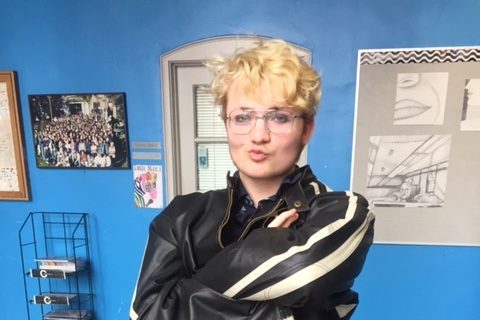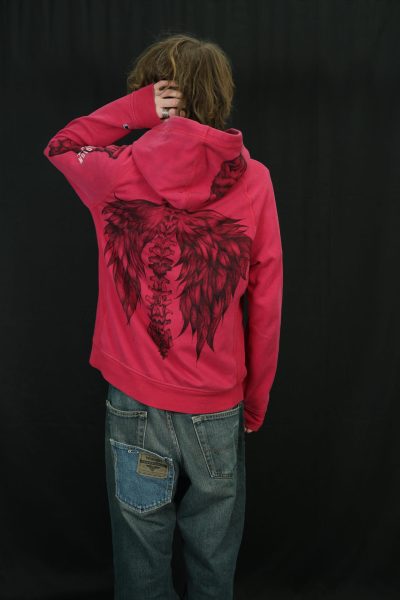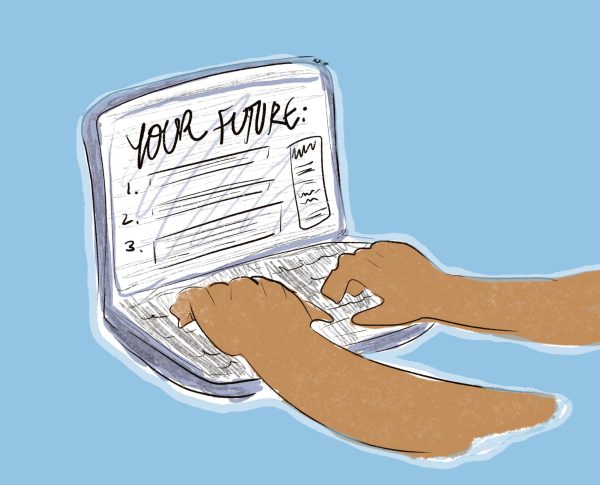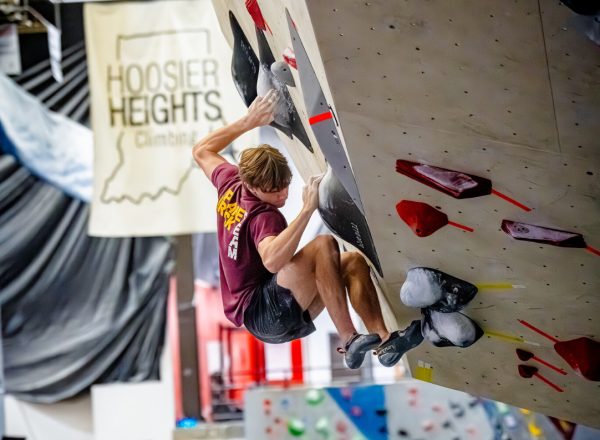Making it up at Community High

“Hey, you look off. You can get that fixed, you know,” Reese Westerdale’s friend said to her. She was in fourth grade, walking down the hallway of her school. It was the first time she thought about wearing makeup. Not because she wanted to, because she thought she had to in order to please her friends.
Westerdale is a freshman at Washtenaw International High School (WiHi), and has had a complicated relationship with makeup for a very long time. Makeup isn’t really her thing, despite her friends’ best efforts in the past.
“They would want to put it on my face and [want] me to buy makeup, sometimes give me makeup.” Westerdale said. “Which is really kind, but I think it would have been better if I was more into it.”
In fourth and fifth grade, Westerdale and her friends would put makeup on for fun.
“Blue eyeshadow and the whole shabang,” she remembered. As they got older, however, makeup was something else. It wasn’t just about fun anymore, it was something being taken seriously by her friends. “I realized ‘Hey, this isn’t fun for me,’ I was kinda just doing it…to keep my friends interest, and my friends don’t have to have the same interests as me.”
Now, Westerdale doesn’t wear makeup.
“I know a lot of people who do wear it,” she said. “And it is interesting watching them progress.”
While Westerdale is very supportive of all her friends, makeup is just not for her.
A common thread in the morning routine of many teens and adults is makeup. Whether they wear it every day, just wear stage makeup, or like to put art on their face, every makeup wearing person has a unique story, reason or experience.
Ariana Levin, a freshman at Community High School, started wearing makeup when she was 12. She began with using the makeup she got for her Bat Mitzvah, and then never stopped. Everyone else was wearing makeup, so why shouldn’t she? It made her feel better about herself.
Levin says it’s common for people to assume things about her because she wears makeup.
“At camp I wore makeup, one of my closest friends kind of assumed that I was a bratty sort of person… I think that was partially because I wore makeup.”
Makeup has been around since 6,000 B.C.E., and is an important part of many people’s morning routine. According to a survey by the Renfrew Center Foundation, 58 percent of girls between the ages of 8 and 18 wear makeup.
Caroline Andrews is also a CHS freshman. Andrews started wearing makeup in sixth grade. She credits herself wearing makeup to the fact that her mom wore makeup.
“At the beginning of the year, I wore makeup just to look better, but now I don’t wear it unless I [want to],” she said.
Both Levin and Andrews’ families have lots of opinions about their makeup usage.
“My grandma used to tell me I wore my makeup too heavily, and that I should take it off,” Andrews said. Levin’s grandmother takes the opposite approach.
“My grandma sort of encourages me to wear makeup, she’s big on taking pictures… it’s kind of awkward.”
When you think of people who wear makeup, you could be thinking of any variety of person, but odds are, it’s a girl. However, there are boys in the world and at Community High wearing makeup, and Romeo Klobucar is always ready to take down a stereotype.
Romeo Klobucar started wearing makeup a little less than a year ago, when his freshman year was wrapping up –– he had more time on his hands, as well as more motivation. For Klobucar, makeup is not an everyday, routine thing, it’s an opportunity to play with facial structure and put art on your face.
Klobucar thinks that if you wear makeup, whoever you are, society has something bad to say about you.
“Me as a gay man, people don’t want me to wear makeup,” Klobucar said. “But then when I do, I fit into this stereotype of gay boy, super feminine, super into drag. It pigeon holes me into that box. There is just the whole stigma against me wearing makeup, talking about makeup or buying makeup.”
“Something I have a lot of problems with is being stereotyped or reduced to one of my identities, that happens far more frequently when I wear makeup,” Klobucar said. He says he doesn’t wear makeup as much anymore, exactly for that reason.
“Every single time I wear makeup, mostly straight women come up to me and they’re like ‘yes queen, you look so good, slay!’” he said. To Klobucar, that’s just another form of his identity being trivialized.
“Don’t listen to anyone who tells you ‘don’t do it,’” Klobucar advised for young boys interested in wearing makeup. “Keep on improving… don’t give up. If you enjoy it, keep on doing it.”








